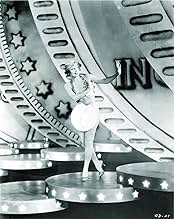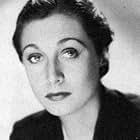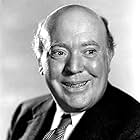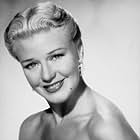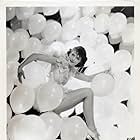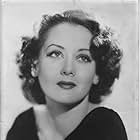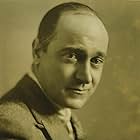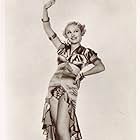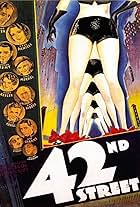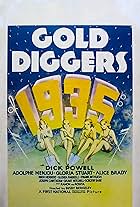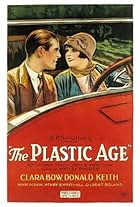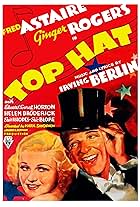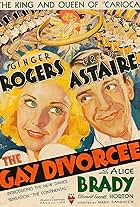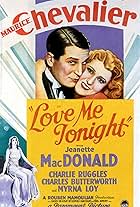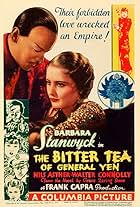IMDb RATING
7.7/10
9.3K
YOUR RATING
A wealthy composer rescues unemployed Broadway performers with a new play, but insists on remaining anonymous.A wealthy composer rescues unemployed Broadway performers with a new play, but insists on remaining anonymous.A wealthy composer rescues unemployed Broadway performers with a new play, but insists on remaining anonymous.
- Nominated for 1 Oscar
- 1 win & 1 nomination total
Robert Agnew
- Dance Director
- (uncredited)
Loretta Andrews
- Gold Digger
- (uncredited)
Monica Bannister
- Gold Digger
- (uncredited)
Bonnie Bannon
- Gold Digger
- (uncredited)
Joan Barclay
- Gold Digger
- (uncredited)
Billy Barty
- Baby in 'Pettin' in the Park' Number
- (uncredited)
Busby Berkeley
- Call Boy
- (uncredited)
Bonnie Blackwood
- Chorus girl
- (uncredited)
Eric Blore
- Complaining Club Member
- (uncredited)
Audrene Brier
- Gold Digger
- (uncredited)
Storyline
Did you know
- TriviaDuring rehearsals of "We're in the Money", Ginger Rogers began goofing off and singing in pig Latin. Studio executive Darryl F. Zanuck overheard her, and suggested she do it for real in the movie.
- GoofsWhen Brad plays piano for Mr. Hopkins, his fingers don't match the sound of the piano.
- Quotes
Trixie Lorraine: "Fanny" is Faneul H. Peabody, just the kind of man I've been looking for, lots of money and no resistance.
- ConnectionsEdited into Busby Berkeley and the Gold Diggers (1969)
- SoundtracksThe Gold Diggers' Song (We're in the Money)
(uncredited)
Music by Harry Warren
Lyrics by Al Dubin
Played during the opening credits and often in the score
Performed by Ginger Rogers (in English and Pig-Latin) and chorus
Played also as dance music by a band
Featured review
Made in the year when the global economic crash hit rock bottom, and the first signs of recovery began to appear, 'Gold Diggers' is very much a product of the Depression. Bread lines and penury are all around, but there is a jaunty air of optimism, too: "the long-lost dollar has come back to the fold".
Polly, Trixie and Carol are three vivacious and attractive showgirls who room together and scrape a precarious living by getting hired for each new Broadway musical as it crops up, and riding their luck until it closes - which is often before it even opens. On the fringe of their group hovers Fay, the smart blonde with the waspish tongue (Ginger Rogers).
The girls are 'gold diggers' in that they waste no opportunity to batten onto rich men. It is hinted during the course of the film that showgirls inhabit a shadowy region on the borders of prostitution, and the harsh economic realities of 1933 force the girls to regard their good looks as a marketable commodity.
A kind of innocent carnality runs through the film. Our three heroines actually sleep together. Fay thinks nothing of changing clothes with Carol, and she gets her backside slapped several times - by both men AND women. Trixie bathes with the door wide open, while Carol preens herself in the scantiest of negligees. The girls contrive to embarrass a rich snob by having him wake up undressed in Carol's bed. The script is loaded with playful smuttiness - taking 'Back Bay codfish' for a ride, making bedroom eyes and so forth.
It is in the show numbers, however, that the real naughtiness is on display. Busby Berkeley had had a phenomenal impact earlier in the year with his staged routines for "42nd Street", and a similar (but more risque) format is used here. Girls strip naked in silhouette, Ginger sings and dances all but nude for "We're In The Money", and metal chastity bodices are breached using can openers.
Ruby Murray and Dick Powell once again team up as the ingenue lovers, this time playing Brad and Polly - "a knockout for the mush interest". Murray is all coy charm and Powell's tenor voice is magnificent. Ginger is, as always, a beautiful and intelligent performer. Watch her pull off the gibberish verses in 'Money', and breezing through the comic dialogue in the apartment scene. Joan Blondell as Carol is simply adorable. Her sad face during the trick played on Lawrence is enough to tell us that she is falling in love. Her performance as The Spirit Of The Depression in "My Forgotten Man" is one of the great images in cinema history.
Warren and Dubin wrote the songs - and what songs! There are amusing, playful numbers like "Pettin' In The Park", with Berkeley choreography to match, and "We're In The Money" is deservedly famous. "In The Shadows" is a lovely ballad, with a set of geodesic walkways and electrically-illuminated violins. The spine-tingling climax is the anthemic "My Forgotten Man".
"Pettin' In The Park" was originally intended to be the closing number (hence Polly in her park outfit during the final reel), but the running-order was changed. A reprise of "Pettin'" as aural wallpaper in the restaurant scene is an understated gem, with a lovely arrangement featuring muted cornets. In a nice little in-joke, the producer likes Brad's songs so much, he decides to fire Warren and Dubin. By the way - who is the girl who sits silently in the armchair throughout that long scene?
The conception for "My Forgotten Man" was "men marching, marching, marching!" A sweeping epic is told in song and action as we see breadlines, tenements, Great War doughboys and much, much more - all in one song! Joan Blondell deters the heartless cop by pulling back the bum's lapel in a vignette of great emotional power. The musical styles range through torch song, jazz, blues and more. Listen out for the trumpet's counter melody as Joan speaks the verses, the negress on the window sill with the divine alto voice, the clarinet and sax obbligato after each sung line, and the gospel-style descant. "Gee, don't it get ya?"
Polly, Trixie and Carol are three vivacious and attractive showgirls who room together and scrape a precarious living by getting hired for each new Broadway musical as it crops up, and riding their luck until it closes - which is often before it even opens. On the fringe of their group hovers Fay, the smart blonde with the waspish tongue (Ginger Rogers).
The girls are 'gold diggers' in that they waste no opportunity to batten onto rich men. It is hinted during the course of the film that showgirls inhabit a shadowy region on the borders of prostitution, and the harsh economic realities of 1933 force the girls to regard their good looks as a marketable commodity.
A kind of innocent carnality runs through the film. Our three heroines actually sleep together. Fay thinks nothing of changing clothes with Carol, and she gets her backside slapped several times - by both men AND women. Trixie bathes with the door wide open, while Carol preens herself in the scantiest of negligees. The girls contrive to embarrass a rich snob by having him wake up undressed in Carol's bed. The script is loaded with playful smuttiness - taking 'Back Bay codfish' for a ride, making bedroom eyes and so forth.
It is in the show numbers, however, that the real naughtiness is on display. Busby Berkeley had had a phenomenal impact earlier in the year with his staged routines for "42nd Street", and a similar (but more risque) format is used here. Girls strip naked in silhouette, Ginger sings and dances all but nude for "We're In The Money", and metal chastity bodices are breached using can openers.
Ruby Murray and Dick Powell once again team up as the ingenue lovers, this time playing Brad and Polly - "a knockout for the mush interest". Murray is all coy charm and Powell's tenor voice is magnificent. Ginger is, as always, a beautiful and intelligent performer. Watch her pull off the gibberish verses in 'Money', and breezing through the comic dialogue in the apartment scene. Joan Blondell as Carol is simply adorable. Her sad face during the trick played on Lawrence is enough to tell us that she is falling in love. Her performance as The Spirit Of The Depression in "My Forgotten Man" is one of the great images in cinema history.
Warren and Dubin wrote the songs - and what songs! There are amusing, playful numbers like "Pettin' In The Park", with Berkeley choreography to match, and "We're In The Money" is deservedly famous. "In The Shadows" is a lovely ballad, with a set of geodesic walkways and electrically-illuminated violins. The spine-tingling climax is the anthemic "My Forgotten Man".
"Pettin' In The Park" was originally intended to be the closing number (hence Polly in her park outfit during the final reel), but the running-order was changed. A reprise of "Pettin'" as aural wallpaper in the restaurant scene is an understated gem, with a lovely arrangement featuring muted cornets. In a nice little in-joke, the producer likes Brad's songs so much, he decides to fire Warren and Dubin. By the way - who is the girl who sits silently in the armchair throughout that long scene?
The conception for "My Forgotten Man" was "men marching, marching, marching!" A sweeping epic is told in song and action as we see breadlines, tenements, Great War doughboys and much, much more - all in one song! Joan Blondell deters the heartless cop by pulling back the bum's lapel in a vignette of great emotional power. The musical styles range through torch song, jazz, blues and more. Listen out for the trumpet's counter melody as Joan speaks the verses, the negress on the window sill with the divine alto voice, the clarinet and sax obbligato after each sung line, and the gospel-style descant. "Gee, don't it get ya?"
- How long is Gold Diggers of 1933?Powered by Alexa
Details
Box office
- Budget
- $433,000 (estimated)
- Gross worldwide
- $105
- Runtime1 hour 37 minutes
- Color
- Sound mix
- Aspect ratio
- 1.33 : 1
Contribute to this page
Suggest an edit or add missing content






